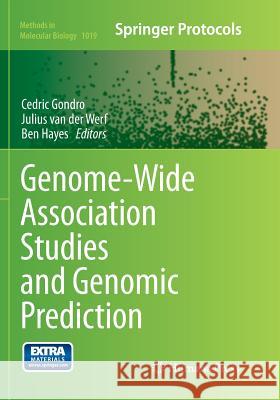Genome-Wide Association Studies and Genomic Prediction » książka



Genome-Wide Association Studies and Genomic Prediction
ISBN-13: 9781493959648 / Angielski / Miękka / 2017 / 566 str.
Genome-Wide Association Studies and Genomic Prediction
ISBN-13: 9781493959648 / Angielski / Miękka / 2017 / 566 str.
(netto: 594,23 VAT: 5%)
Najniższa cena z 30 dni: 597,58
ok. 16-18 dni roboczych.
Darmowa dostawa!
This Methods in Molecular Biology(TM) book covers phenotypes of interest as well as design issues for GWAS, methods for storing and handling large datasets, quality control measures, haplotype inference, and imputation and statistical approaches to data analysis.
From the reviews:
"A detailed review that will help both genomics newbies and experts to have a better picture of what their genome sequences can offer them today. ... People working in medicine and health sciences should read this book and get involved in the field. ... anyone unfamiliar with the topic, but with the desire to learn more about what they could find in their own genome, can start learning from scratch by reading this book." (Alejandra Manjarrez, Lab Times, Issue 5, September, 2013)
"A practical guide for experts to obtain, qualify, and statistically analyse data on genomes and to support genotype-phenotype information. In a growing field, this is the first hands-on book for experts in a relatively new discipline. ... the book is too good to ignore once you start reading and pick up information along the way. ... if you are new to the field, this book will certainly extend you a warm welcome to the tricky world of GWAS." (Vijay Shankar, Lab Times, Issue 6, 2013)
1. R for Genome-Wide Association Studies
Cedric Gondro, Laercio R. Porto-Neto, and Seung Hwan Lee
2. Descriptive Statistics of Data: Understanding the Data Set and Phenotypes of Interest
Sonja Dominik
3. Designing a Genome-Wide Association Studies (GWAS): Power, Sample Size, and Data Structure
Roderick D. Ball
4. Managing Large SNP Datasets with SNPpy
Faheem Mitha
5. Quality Control for Genome-Wide Association Studies
Cedric Gondro, Seung Hwan Lee, Hak Kyo Lee, and Laercio R. Porto-Neto
6. Overview of Statistical Methods for Genome-Wide Association Studies (GWAS)
Ben Hayes
7. Statistical Analysis of Genomic Data
Roderick D. Ball
8. Using PLINK for Genome-Wide Association Studies (GWAS) and Data Analysis
Miguel E. Rentería, Adrian Cortes, and Sarah E. Medland
9. Genome-Wide Complex Trait Analysis (GCTA): Methods, Data Analyses, and Interpretations
Jian Yang, Sang Hong Lee, Michael E. Goddard, and Peter M. Visscher
10. Bayesian Methods Applied to Genome-Wide Association Studies (GWAS)
Rohan L. Fernando and Dorian J. Garrick
11. Implementing a QTL Detection Study (GWAS) Using Genomic Prediction Methodology
Dorian J. Garrick and Rohan L. Fernando
12. Genome-Enabled Prediction Using the BLR (Bayesian Linear Regression) R-Package
Gustavo de los Campos, Paulino Pérez, Ana I. Vazquez, and José Crossa
13. Genomic Best Linear Unbiased Prediction (gBLUP) for the Estimation of Genomic Breeding Values
Samuel A. Clark and Julius van der Werf
14. Detecting Regions of Homozygosity to Map the Cause of Recessively Inherited Disease
James W. Kijas
15. Use of Ancestral Haplotypes in Genome-Wide Association Studies
Tom Druet and Frédéric Farnir
16. Genotype Phasing in Populations of Closely Related Individuals
John M. Hickey
17. Genotype Imputation to Increase Sample Size in Pedigreed Populations
John M. Hickey, Matthew A. Cleveland, Christian Maltecca, Gregor Gorjanc, Birgit Gredler, and Andreas Kranis
18. Validation of Genome-Wide Association Studies (GWAS) Results
John M. Henshall
19. Detection of Signatures of Selection Using FST
Laercio R. Porto-Neto, Seung Hwan Lee, Hak Kyo Lee, and Cedric Gondro
20. Association Weight Matrix: A Network-Based Approach Towards Functional Genome-Wide Association Studies
Antonio Reverter and Marina R.S. Fortes
21. Mixed Effects Structural Equation Models and Phenotypic Causal Networks
Bruno Dourado Valente and Guilherme Jordão de Magalhães Rosa
22. Epistasis, Complexity, and Multifactor Dimensionality Reduction
Qinxin Pan, Ting Hu, and Jason H. Moore
23. Applications of Multifactor Dimensionality Reduction to Genome-Wide Data Using the R Package ‘MDR’
Stacey Winham
24. Higher Order Interactions: Detection of Epistasis Using Machine Learning and Evolutionary Computation
Ronald M. Nelson, Marcin Kierczak, and Örjan Carlborg
25. Incorporating Prior Knowledge to Increase the Power of Genome-Wide Association Studies
Ashley Petersen, Justin Spratt, and Nathan L. Tintle
26. Genomic Selection in Animal Breeding Programs
Julius van der Werf
With the detailed genomic information that is now becoming available, we have a plethora of data that allows researchers to address questions in a variety of areas. Genome-wide association studies (GWAS) have become a vital approach to identify candidate regions associated with complex diseases in human medicine, production traits in agriculture, and variation in wild populations. Genomic prediction goes a step further, attempting to predict phenotypic variation in these traits from genomic information. Genome-Wide Association Studies and Genomic Prediction pulls together expert contributions to address this important area of study. The volume begins with a section covering the phenotypes of interest as well as design issues for GWAS, then moves on to discuss efficient computational methods to store and handle large datasets, quality control measures, phasing, haplotype inference, and imputation. Later chapters deal with statistical approaches to data analysis where the experimental objective is either to confirm the biology by identifying genomic regions associated to a trait or to use the data to make genomic predictions about a future phenotypic outcome (e.g. predict onset of disease). As part of the Methods in Molecular Biology series, chapters provide helpful, real-world implementation advice.
1997-2026 DolnySlask.com Agencja Internetowa
KrainaKsiazek.PL - Księgarnia Internetowa









